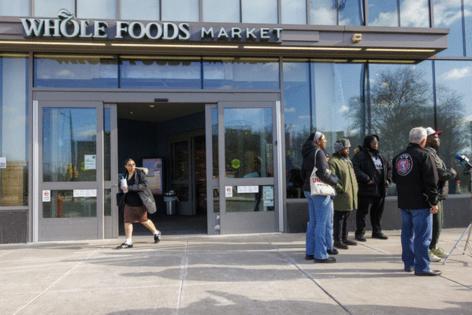Whole Foods union victory upheld by US Labor Board official
Published in Business News
Whole Foods Market’s effort to overturn a unionization vote at a Philadelphia store was rejected by a U.S. labor board official, a step towards requiring Amazon.com Inc.’s grocery chain to collectively bargain with U.S. employees for the first time.
In a Thursday filing, a National Labor Relations Board hearing officer concluded Whole Foods’ claims of election misconduct at the Philadelphia store should be overruled and the union should be formally certified. Workers at the store voted 130 to 100 in January to unionize with the United Food & Commercial Workers.
Whole Foods has argued that the result should be overturned, alleging the union made promises and provided free election day car rides that prevented a fair election, and that a ruling by the agency’s Democratic members deprived the company of its rights. The union has denied wrongdoing.
“All of the objections are without merit,” the NLRB hearing officer said in a report viewed by Bloomberg News.
“We remain confident that our objections will ultimately be upheld as the full process plays out,” Whole Foods said in an emailed statement.
The company is likely to appeal the case, which could drag on for months or years, and offer President Donald Trump’s appointees a chance to establish a more business-friendly precedent. If a regional director affirms the hearing officer’s recommendations, Whole Foods can file an appeal with the labor board’s members in Washington DC. But the board currently lacks the three-member quorum required to issue rulings, because Trump fired Democratic member Gwynne Wilcox. A federal district court judge ruled that termination was illegal, but an order from Chief Justice John Roberts allows the president to temporarily oust her while the litigation over her case continues.
If Trump installs a Republican majority on the board, they could embrace Whole Foods’ objections and throw out the UFCW’s election win. The case could also be a vehicle to change the agency’s stance on mandatory anti-union “captive audience” meetings, which Wilcox and other Democratic NLRB members, in a separate case last November involving Amazon warehouse workers, ruled are illegally coercive.
Whole Foods argued that the precedent-setting decision violated its constitutional rights and prevented a fair vote in Philadelphia. “On multiple occasions, team members refused to attend or walked out of scheduled meetings during which WFM chose to address facts, experience and opinions about union representation,” the company said in a February filing.
The company was still able to communicate its view on unionization in a variety of ways in addition to group and one-on-one meetings, the hearing officer said in the Thursday report: “It hung posters and distributed flyers as well as projected messages and videos on televisions — all on paid time — as well as sent employees multiple electronic messages.”
(With assistance from Bill Haubert.)
©2025 Bloomberg L.P. Visit bloomberg.com. Distributed by Tribune Content Agency, LLC.












Comments